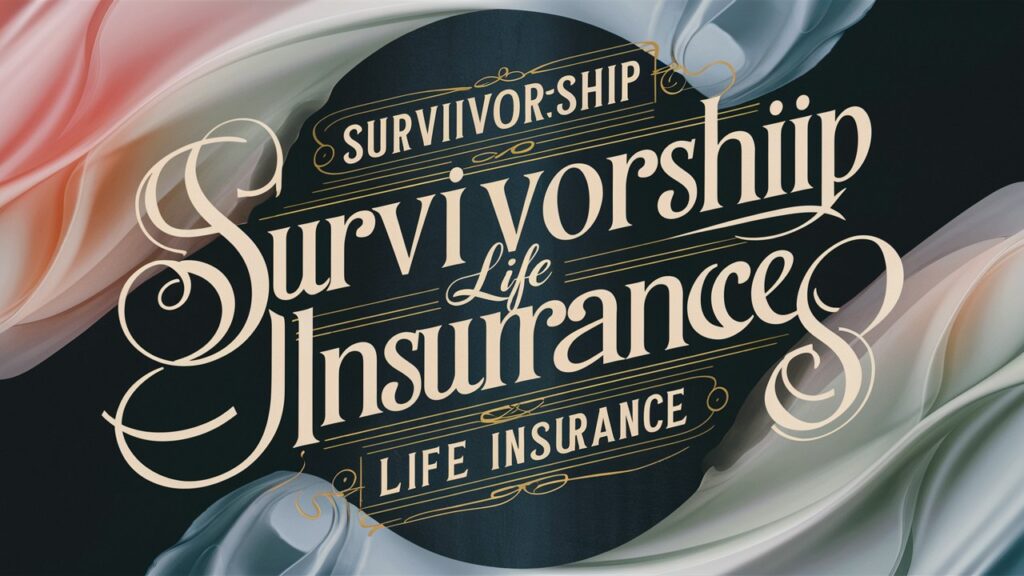In the realm of financial planning, Survivorship Life Insurance stands out as a strategic tool for couples. This unique policy covers two lives and pays a benefit only after both have passed, offering robust estate planning benefits and potential cost savings. Discover how this insurance can safeguard your legacy and ensure financial stability for your loved ones.
Introduction
Survivorship life insurance, also known as second-to-die insurance, is a unique type of life insurance policy that covers two individuals, typically spouses, under one policy. Unlike traditional life insurance policies that pay out upon the death of the insured individual, It pays a death benefit only after both insured parties have passed away. This type of insurance is often used for estate planning purposes, providing a financial safety net for beneficiaries or covering estate taxes. In this comprehensive guide, we’ll delve into the specifics of It, its benefits, considerations, and how it fits into your overall financial planning strategy.
What is Survivorship Life Insurance?
It is designed to provide a financial benefit to beneficiaries after the death of both insured individuals covered by the policy. It’s commonly used by couples who want to ensure their heirs receive a substantial payout to cover estate taxes or other financial obligations that arise after their passing. Here’s how it works
- Coverage for Two Lives
Unlike individual life insurance policies, It covers two people, typically spouses. The policy pays out after the death of the second insured person.

- Estate Planning Tool
One of the primary purposes of survivorship life insurance is to help with estate planning. It provides liquidity to pay estate taxes, which can be significant and may force heirs to sell off assets if not properly planned for.
- Lower Premiums
Because the insurance company assumes it won’t have to pay the death benefit until both insured individuals have passed away, premiums for survivorship life insurance are often lower than those for two separate individual policies.
Types of Survivorship Life Insurance
There are two main types of survivorship life insurance policies
- Survivorship Whole Life Insurance
This type of policy provides a death benefit and builds cash value over time, similar to traditional whole life insurance. The premiums are fixed, and part of each premium payment goes towards the cash value component of the policy.
- Survivorship Universal Life Insurance
This policy also covers two insured individuals but offers more flexibility than whole life insurance. It allows for adjustable premiums and death benefits, as well as a cash value component that earns interest based on market rates.
Benefits of Survivorship Life Insurance
It offers several advantages that make it a valuable addition to estate planning:
- Estate Tax Coverage
By providing a lump sum payment upon the death of the second insured person, It can help heirs cover estate taxes without needing to sell off assets.
- Protecting Assets
It ensures that the intended beneficiaries receive a financial benefit, which can be crucial for maintaining family assets or business continuity.
- Guaranteed Insurability
Policies often include a guaranteed insurability rider, allowing policyholders to purchase additional coverage without a medical exam, which can be advantageous if health conditions change.
Considerations Before Purchasing Survivorship Life Insurance
Before deciding on a survivorship life insurance policy, consider the following factors
- Financial Goals
Determine how It fits into your overall financial plan and whether it aligns with your estate planning objectives.

- Premium Payments
While premiums for survivorship life insurance are typically lower than for two separate policies, they still represent a long-term financial commitment. Ensure that the premiums are manageable over time.
- Policy Features
Compare different policies to understand the specific features, such as cash value accumulation, premium flexibility, and death benefit options.
Is Survivorship Life Insurance Right for You?
It can be a powerful tool for couples looking to protect their estate and provide financial security for their heirs. It’s particularly beneficial for those with significant assets subject to estate taxes or complex family situations. Here are a few scenarios where It might be suitable:
- High Net Worth Individuals
If you have substantial assets that may be subject to estate taxes, It can help your heirs cover these expenses without liquidating assets.
- Business Owners
It can ensure continuity of business operations by providing funds to buy out a deceased partner’s share of the business or cover other financial obligations.
- Complex Family Dynamics
In blended families or situations where inheritance could be contentious, It provides a clear financial benefit that’s not tied to individual lifespans.
Conclusion
It offers a strategic solution for couples seeking to protect their legacy and provide financial stability for their loved ones. By covering two lives under one policy and paying out upon the death of the second insured individual, it addresses estate planning needs effectively. Whether you’re planning for estate taxes, protecting family assets, or ensuring business continuity, It can play a crucial role in your financial strategy. Consider consulting with a financial advisor or insurance expert to explore how It fits into your overall financial plan and helps achieve your long-term goals.
For more details please visit our home page: Click Here

